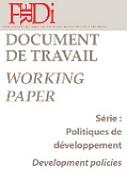
Kpodar K. et Imam P. 2015. "Does A Regional Trade Agreement Lessen or Worsen Growth Volatility? An Empirical Investigation" Document de travail Ferdi P137, novembre 2015 (également document de travail FMI, WP/15/177 : http://www.imf.org/external/pubs/ft/wp/2015/wp15177.pdf)